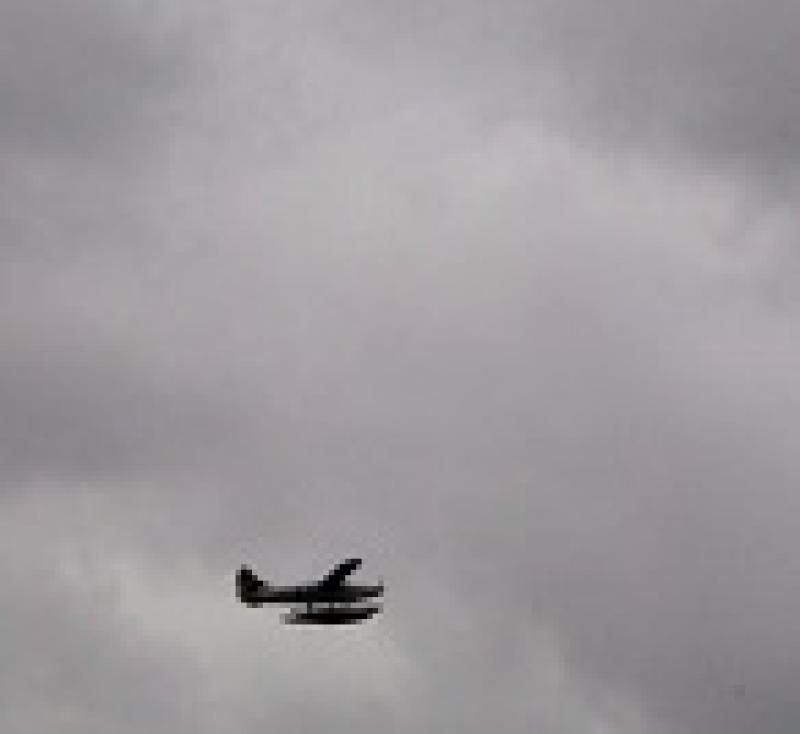Canadian company to service remote Canada using self-flying plane in one-year deal with feds
By: Michael Lee CTVNews (Canada Television News)
BUZZ NOTE: There is a relevant video of an interview with the company CEO explaining this concept that can be accessed by clicking on the "SEEDED CONTENT" link just below this message, which will open the original source article.

Canadian company to service remote Canada using self-flying plane in one-year deal with feds

Rain clouds are the backdrop for a float plane flying over downtown Vancouver, B.C., July 3, 2012. THE CANADIAN PRESS/Jonathan Hayward
A Canadian startup has received a yearlong contract with the federal government to deliver cargo to remote areas of Canada using a self-flying airplane.
Ribbit, an autonomous plane service company founded in 2020, and the federal government have agreed to a one-year, $1.3-million contract to test the airline's self-flying technology.
Jeremy Wang, chief operating officer of Ribbit and a graduate of the University of Waterloo , says the airline uses a conventional fixed-wing airplane retrofitted with software and hardware so it can fly fully autonomously.
"You can sort of think of it like a really advanced autopilot, so from gate-to-gate the airplane will do everything by itself," he told CTV's Your Morning on Tuesday.
This includes taxi, takeoff and landing, Wang said. His co-founder, Carl Pigeon, told CTV News Kitchener in May that the company had been approved to fly without a pilot on board at a test range in Alberta.
The goal, Wang says, is to make transportation more accessible and reliable for everyone.
"So with small, autonomous planes flying frequently and doing so in a really cost-effective manner, we hope to make a difference for these communities for things like food, medicine and other time-sensitive supplies," he said.
Public records show that Innovation, Science and Economic Development Canada awarded a one-year contract worth more than $1.3 million to Ribbit on May 18 .
A spokesperson for Transport Canada told CTVNews.ca in an email on Thursday that the contract is through a program called Innovative Solutions Canada (ISC), described as helping Canadian startups and small- or medium-sized businesses "develop their innovations to stimulate technology research, development and commercialization of Canadian innovations."
"The contract will enable Ribbit to test and demonstrate the capabilities of their pilotless cargo aircraft system," the spokesperson said. "Transport Canada is participating in reviewing the results of these tests as a supporting department of the ISC program to help inform departmental knowledge of the company's proposed technology."
The company also announced in a news release on Thursday further details of its contract with the federal government.
Ribbit says it will provide Transport Canada with a single aircraft, as well as a remote crew and maintenance services, for autonomous cargo flights for one year.
The news release from Ribbit says it has completed more than 200 hours of "hands-free flight" on a two-seat airplane and received a Special Flight Operations Certificate in 2022 allowing uncrewed flight tests.
The company also says it has received letters of intent from "leading retailers" worth $42 million a year.
Ribbit will aim to show that its technology is safe and works in a northern environment, Wang said, with data from these flights used to guide future policy and regulation.
Wang also sees potential for this technology in other remote regions of the world, including in Alaska, central Australia, areas of continental Africa and island nations, with a long-term goal of carrying passengers.
Watch the full interview with Jeremy Wang at the top of the article. With files from CTV News Kitchener Videographer Krista Sharpe.
The administrator of this group reserves the right, along with the site moderators, to moderate all and any postings to this group, including the right to enforce the ToS, the CoC, and also including anything that the administrator deems within his sole discretion to be offensive, including but not limited to political and/or off topic comments, with the power to delete in exercising that right.
It would be best, therefore, to be civil in posting on this group and not contravene the CoC, the ToS, and to not post comments that are political, insulting, taunting, trollling or offensive.
By now it should be well known that I am unable to open certain sources, videos and pictures. If I cannot, I will ask that they be described and explained. If the poster refuses to comply, their comment will be deleted. Instagrams are banned.





Personally I'm reticent about getting into a driverless taxi so sure as hell I would never get into a pilotless airplane. Think of a scene from the movie The Fifth Element when taxi driver Bruce Willis is flying his taxi.
Only moving cargo...Good thing I guess.
I wouldn't jump in one for a flight.
In the video it was indicated that eventually 6 to 9 passenger aircraft will be use for passengers.
I would but not without a parachute, lol
Thanks for my first morning laugh out loud.
Hope the planes come equipped with big parachutes and good inflatable airbags.
Won't be any help if it rams into an Airbus.
Well this could prove to be an interesting experiment
I think that rather than being involved in experiments I'd prefer the tried and true.
There's no progress without experimentation:)
LOL. Okay, for this particular experimentation, you can be the pioneer. I'll sit this one out.
Morning...hmm not sure about planes but I know they are already using drones here in the Outback..
Many station owners use them now to check the water troughs, fences and cattle etc. Some areas are using them to deliver mail and medicine as some stations are 200 Kms from their front gate..long way to go and collect your mail..
But as for getting in a pilotless plane, nope not this little black duck...
Drones are okay. Pilotless planes can be fine too, for someone else.